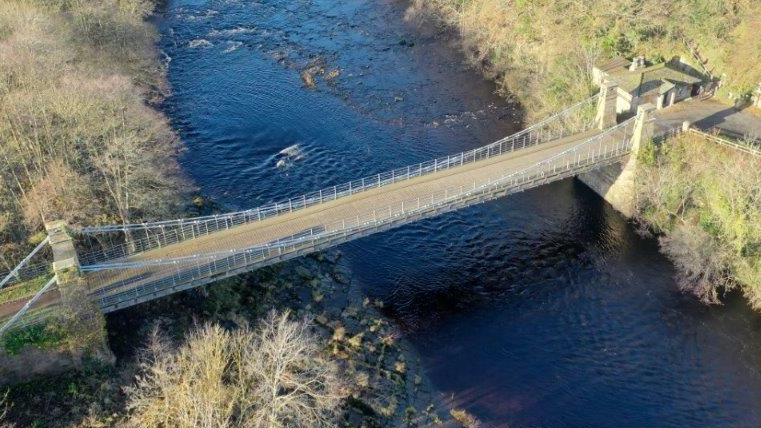Levelling up projects 'on track' insists council

Whorlton Bridge has been closed to all users ahead of restoration
- Published
A council says its levelling up projects are on track after concerns over delays were raised nationally.
Just 10% of levelling up funding available across the country has been spent and is making a difference "on the ground", according to a recent report from the Public Accounts Committee (PAC).
In light of the report, Durham County Council said its projects are progressing well.
The authority's £20m bid to the government's flagship Levelling Up Fund was approved in 2021, with £12m expected to be spent by the end of March.
In its report on key elements of the government's pledge to address regional inequalities, PAC said little evidence had been provided of projects delivered nationally.
Durham's council was awarded £20m for projects around Barnard Castle, Bishop Auckland and Shildon, including the re-opening of the historic Whorlton Bridge, the re-routing of the A168 to bypass Toft Hill, and improvements to access and attractions at the Locomotion museum.
Amy Harhoff, the council's corporate director of regeneration and economic growth, said it expects to use the total amount of funding by March 2025 and match funding after that, where necessary.
She said preparations to restore Whorlton Bridge were already underway, and progress was ongoing at the Locomotion, where a new exhibition hall has been erected.
Delays
Development work is ongoing for the Toft Hill bypass, with a public consultation expected to take place later this year, according to the Local Democracy Reporting Service, external.
Ms Harhoff said: “Major projects are challenging for councils nationally due to their complexity and, often, the process includes tight bidding and spend deadlines once money has been announced.
"However, as a local authority with a commitment to our communities, we will always pursue external funding to enable us to deliver the investment and regeneration for County Durham.”
When asked about delays to spending and the delivery of Levelling Up projects elsewhere in the country, a spokesman for the Department for Levelling Up, Housing and Communities (DLUHC) cited a combination of "project specific issues", the pandemic, and inflation.
"Buildings do not go up overnight," he added.
"These are multi-year programmes, so it is to be expected that the capital spend ramps up in later years."
Follow BBC Sunderland on X (formerly Twitter), external, Facebook, external and Instagram, external. Send your story ideas to northeastandcumbria@bbc.co.uk.
Related topics
More stories from BBC North East and Cumbria
- Published14 March 2024

- Published11 February 2024
